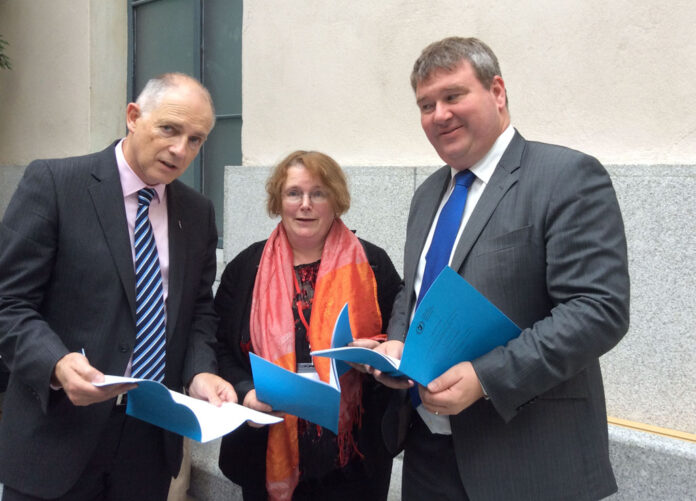CLARE Senator Martin Conway is calling for the criminalisation of domestic violence.
Senator Conway, who is a member of the Oireachtas Committee on Justice, Defence and Equality, was speaking following the launch of the committee’s report on domestic and sexual violence.
“The committee heard that violence, in a domestic context, is often treated differently to public assault, where public assault is treated more seriously. This is completely unacceptable and the State needs to ensure that, to the greatest possible extent, this crime should be treated as being as serious, if not more serious than, many other forms of criminal and common law assault,” he said.
The committee’s report calls for a wider definition of domestic violence and seeks to have domestic abuse introduced into Irish law. The proposal envisages the use of specially trained and experienced judges in a ‘one family, one judge’ model, which would be complemented by the provision of specially trained support services aimed at assisting the victim.
The report also outlined that consideration should be given to establishing a domestic violence register, to catalogue details of convicted abusers.
“Given the very serious nature of domestic violence and the profound psychological and emotional effects it has, it is essential that the Government makes clear that violence of this kind will not be tolerated and I urge the Minister for Justice and Equality, Frances Fitzgerald, TD to ensure that the detailed recommendations of this report are implemented in early course,” Senator Conway concluded.
Also present at the launch of the report was Ennis woman Caroline Counihan, who is the legal director of Rape Crisis Network Ireland.
“There are some great recommendations” in the report, according to Ms Counihan, but there was one, for her, which stood out, that is the proposed establishment of specialised units within An Garda Síochána, medical personnel, prosecution lawyers and support services that are dedicated to the investigation and prosecution of domestic and sexual crime.
Ms Counihan said she felt this is key to providing proper support for victims of sexual violence.
“It’s very important that victims aren’t treated all the same but that individual needs are catered for and, in that regard, that recommendation, I think, chimes in very well with the incoming EU directive on victims’ rights, which talks about individual assessments to identify specific protection needs,” she said.
Other recommendations the Rape Crisis Network welcomed includes not allowing the accused in a sexual trial to cross-examine the victim in person and that the age of consent remains at 17.
“It is one of those reports that is very concise but I think it packs a punch for that reason. We are very pleased to see that there should be a definition of consent and that consent would be fully defined because we have advocated for that for years. Also, the law governing sexual offences should be codified into a single act, which is one that is dear to my heart after years of going through eight or nine statutes to find something out,” Ms Counihan continued.
She outlined that one of things the network has advocated for is having a list of circumstances in which there is no consent. She said she was happy to see this addressed in the report.
“I think laying all that out and laying out a positive definition emphasizes that consent is vital. I think that is important because it sets down a marker as well that certain kinds of behaviour are unacceptable and does not represent consent,” she said.
Although domestic violence is not Ms Counihan’s area of expertise, she said, “I would feel when it [domestic violence] is identified, named and defined and there are specific offences identified as domestic violence, it becomes more important and more visible and that’s important”.
The committee’s report also endorses the implementation of the Swedish model in combating prostitution, that is, to criminalise the purchase of sexual services, while decriminalising and providing support services to those who sell sexual services through prostitution.
Although this recommendation was made to Government in 2012, Ms Counihan remains optimistic that it will be implemented.
“I’m maybe a little bit disappointed but I’m not pessimistic. It is complex and there are challenges in it and it is important to get it right, so it may take a little bit of time to get it but I don’t think that’s a bad thing,” she said.
It was also recommended that a domestic violence register be set up.
Ms Counihan said her feeling on this is that it might act as a very serious deterrent, but she said it is difficult to know if that is true to say.
“You might say, has the sex offenders register deterred anyone from sex offending and, to the best of my knowledge, no one has done research on that,” she noted.
“I would have thought that if a person is otherwise of good character and there is a possibility that if they are detected, investigated, prosecuted and found guilty of a domestic violence offence and if there’s a possibility that they would be placed on a register, I would surely have thought that must have a deterrent effect,” she concluded.
A native of Ennis, Colin McGann has been editor of The Clare Champion since August 2020. Former editor of The Clare People, he is a journalism and communications graduate of Dublin Institute of Technology.


